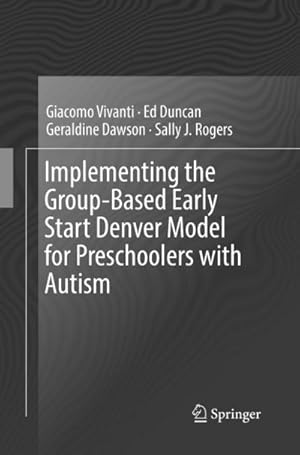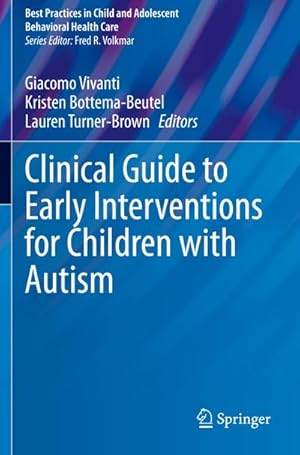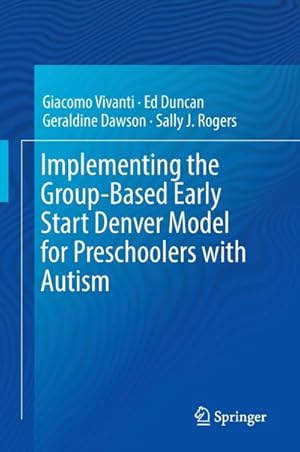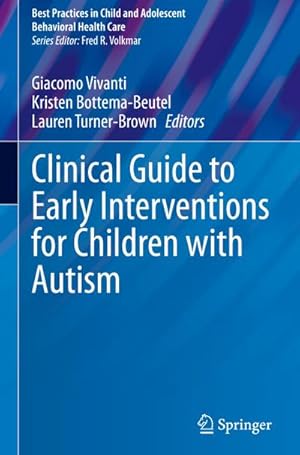vivanti giacomo (4 Ergebnisse)
Produktart
- Alle Produktarten
- Bücher (4)
- Magazine & Zeitschriften
- Comics
- Noten
- Kunst, Grafik & Poster
- Fotografien
- Karten
-
Manuskripte &
Papierantiquitäten
Zustand
- Alle
- Neu
- Antiquarisch/Gebraucht
Einband
Weitere Eigenschaften
- Erstausgabe
- Signiert
- Schutzumschlag
- Angebotsfoto
Land des Verkäufers
Verkäuferbewertung
-
Implementing the Group-Based Early Start Denver Model for Preschoolers with Autism
Verlag: Springer International Publishing, 2018
ISBN 10: 3319842161ISBN 13: 9783319842165
Anbieter: AHA-BUCH GmbH, Einbeck, Deutschland
Buch
Taschenbuch. Zustand: Neu. Druck auf Anfrage Neuware - Printed after ordering - This book examines a group-based adaptation of the Early Start Denver Model (ESDM) designed for use with preschoolers with autism spectrum disorder (ASD). It describes the principles and procedures of the Group-Based Early Start Denver Model (G-ESDM) and provides practical and empirical guidelines for implementing effective, affordable programs across public healthcare and educational settings. Chapters offer rationales and strategies for designing and evaluating interventions, building interdisciplinary teams, and organizing learning spaces to engage student interest. Examples discuss the social interactions in groups that provide opportunities for learning, improving interpersonal skills, and reducing problem behaviors. In addition, the book offers ideas for retooling teaching strategies when an individual child lags behind the rest of the group. Featured topics include:Creating treatment objectives in the G-ESDM.Setting up the G-ESDM team and learning environment. Development of the G-ESDM classroom curriculum. Practical tools such as decision-making trees, teaching templates, and fidelity systems. Facilitating learning through peer interactions and social participation. Implementing the Group-Based Early Start Denver Model for Preschoolers with Autism is a must-have resource for clinicians and practitioners as well as researchers, professors, and graduate students in the fields of child and school psychology, behavioral therapy, and social work along with psychiatry, pediatrics, and educational and healthcare policy.
-
Clinical Guide to Early Interventions for Children with Autism
Verlag: Springer International Publishing, 2021
ISBN 10: 3030411621ISBN 13: 9783030411626
Anbieter: AHA-BUCH GmbH, Einbeck, Deutschland
Buch
Taschenbuch. Zustand: Neu. Druck auf Anfrage Neuware - Printed after ordering - This book examines early interventions for children with autism spectrum disorder (ASD) with the goal to enable primary care physicians as well as other clinicians, therapists, and practitioners to assist parents in making informed decisions based on current research. It provides a map for successfully navigating the maze of early interventions for ASD, focusing on evidence. Chapters review the similarities and differences between current evidence-based treatments, how these treatments work, the factors that facilitate their effectiveness, and the pros and cons of their use for different children and different needs. In addition, chapters discuss the services, laws, policies, and societal issues related to early intervention in ASD.Featured topics include:Criteria to evaluate evidence in ASD interventions.Effective approaches for Social communication difficulties in ASD.Effective approaches for Restricted and repetitive behaviors (RRBs)in ASD.Naturalistic, developmental approaches to early intervention for children with ASDThe TEACCH approach and other visually based approaches for children with ASD.Applied Behavior Analysis (ABA) approaches to early intervention for children with ASD.What works for whom in ASD early interventionClinical Guide to Early Interventions for Children with Autismis an essential resource for clinicians, primary care providers, and other practitioners as well as researchers, professors, and graduate students in the fields of child, school, and developmental psychology, pediatrics, social work, child and adolescent psychiatry, primary care medicine, and related disciplines.
-
Implementing the Group-Based Early Start Denver Model for Preschoolers with Autism
Verlag: Springer International Publishing, 2016
ISBN 10: 3319496905ISBN 13: 9783319496900
Anbieter: AHA-BUCH GmbH, Einbeck, Deutschland
Buch
Buch. Zustand: Neu. Druck auf Anfrage Neuware - Printed after ordering - This book examines a group-based adaptation of the Early Start Denver Model (ESDM) designed for use with preschoolers with autism spectrum disorder (ASD). It describes the principles and procedures of the Group-Based Early Start Denver Model (G-ESDM) and provides practical and empirical guidelines for implementing effective, affordable programs across public healthcare and educational settings. Chapters offer rationales and strategies for designing and evaluating interventions, building interdisciplinary teams, and organizing learning spaces to engage student interest. Examples discuss the social interactions in groups that provide opportunities for learning, improving interpersonal skills, and reducing problem behaviors. In addition, the book offers ideas for retooling teaching strategies when an individual child lags behind the rest of the group. Featured topics include:Creating treatment objectives in the G-ESDM.Setting up the G-ESDM team and learning environment. Development of the G-ESDM classroom curriculum. Practical tools such as decision-making trees, teaching templates, and fidelity systems. Facilitating learning through peer interactions and social participation. Implementing the Group-Based Early Start Denver Model for Preschoolers with Autism is a must-have resource for clinicians and practitioners as well as researchers, professors, and graduate students in the fields of child and school psychology, behavioral therapy, and social work along with psychiatry, pediatrics, and educational and healthcare policy.
-
Clinical Guide to Early Interventions for Children with Autism
Verlag: Springer International Publishing, 2020
ISBN 10: 3030411591ISBN 13: 9783030411596
Anbieter: AHA-BUCH GmbH, Einbeck, Deutschland
Buch
Buch. Zustand: Neu. Druck auf Anfrage Neuware - Printed after ordering - This book examines early interventions for children with autism spectrum disorder (ASD) with the goal to enable primary care physicians as well as other clinicians, therapists, and practitioners to assist parents in making informed decisions based on current research. It provides a map for successfully navigating the maze of early interventions for ASD, focusing on evidence. Chapters review the similarities and differences between current evidence-based treatments, how these treatments work, the factors that facilitate their effectiveness, and the pros and cons of their use for different children and different needs. In addition, chapters discuss the services, laws, policies, and societal issues related to early intervention in ASD.Featured topics include:Criteria to evaluate evidence in ASD interventions.Effective approaches for Social communication difficulties in ASD.Effective approaches for Restricted and repetitive behaviors (RRBs)in ASD.Naturalistic, developmental approaches to early intervention for children with ASDThe TEACCH approach and other visually based approaches for children with ASD.Applied Behavior Analysis (ABA) approaches to early intervention for children with ASD.What works for whom in ASD early interventionClinical Guide to Early Interventions for Children with Autismis an essential resource for clinicians, primary care providers, and other practitioners as well as researchers, professors, and graduate students in the fields of child, school, and developmental psychology, pediatrics, social work, child and adolescent psychiatry, primary care medicine, and related disciplines.





